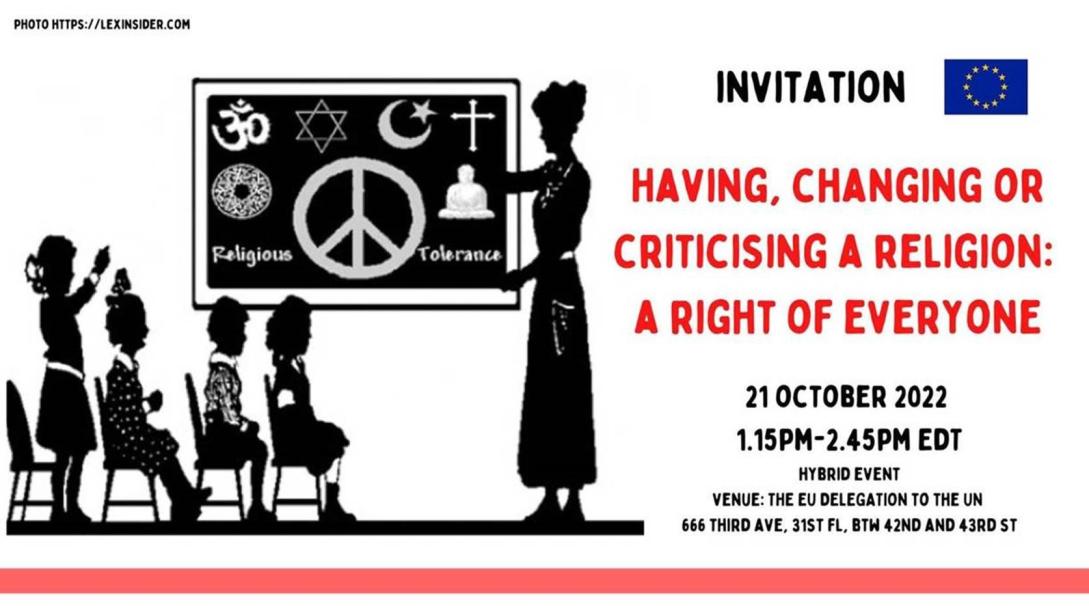Having, Changing, Criticising a Religion: a Right for Everyone

Concept Note
Freedom of religion or belief and freedom of expression are interdependent, interrelated and mutually reinforcing rights. They protect all persons - not religions or beliefs per se. Freedom of expression includes freedom to seek, receive and impart information and ideas of all kinds. By allowing a free exchange of ideas, where different views can be expressed, societies can develop and progress.
By the same token, the right to freedom of religion or belief does not include the right for one‘s religion or belief to be free from criticism, adverse comment or even ridicule.
Despite these basic and established principles of international human rights law, misunderstandings and misleading interpretations about the relations between freedom of religion or belief and freedom of expression persist to this day. In particular, it is important to distinguish between the expressions of opinion, even if deemed offensive by some, and advocacy of religious hatred that constitutes incitement to discrimination, hostility or violence (ICCPR article 20). Freedom of expression includes statements that may offend people, challenge their perceptions or hurt their religious feelings.
In this context, it is also important to protect the rights of an often forgotten group, namely those who do not confess to any religion or belief at all. Theistic, non-theistic and atheistic beliefs - as well as the right not to profess any religion or belief at all - are equally protected under article 18 of the ICCPR.
Human Rights Council Resolution 16/18 from 2011, and the subsequent Istanbul Process, were important steps in efforts to confront religious intolerance and served to move away from the old discourse of ‘defamation of religions’. Efforts should be made to bring back momentum to the Istanbul Process
Significant steps have been taken already in the global movement to abolish laws against blasphemy and apostasy. In particular, the Rabat Plan of Action expressly calls for the repeal of blasphemy laws, drawing upon the guidance of the Human Rights Committee in their General Comment No. 34.
International human rights law does not allow penalising or discriminating against individuals for leaving or changing their religion or belief or for inducing others to change a religion or belief. Regrettably, limitations to the absolute right to change or leave one’s religion or belief are among the most common violations of freedom of religion or belief.
Despite a global movement to abolish blasphemy laws, more than 70 countries maintain these laws. These laws penalise insulting or showing contempt or lack of reverence to a deity, or sacred objects, or toward something considered sacred or inviolable. Moreover, apostasy (abandoning or rejecting one's religion) is criminalised in 22 countries.
Despite the limitation under international law that the death penalty may only be applied for the most serious crimes, at least thirteen countries sentence the death penalty for blasphemy and apostasy. Currently, six countries maintain the death penalty for apostasy only. Seven countries maintain the death penalty for both apostasy and blasphemy.
Unfortunately, there have been many incidents recently. Extremely worrying incidents continue to happen. For instance, in January 2022, a woman was sentenced to death after being convicted of sending an allegedly blasphemous text message and caricatures via WhatsApp. In December 2021, a Sri Lankan national working in a factory abroad was killed by a mob over blasphemy suspicions. In May 2022, a female student was murdered by a mob after having sent an allegedly blasphemous WhatsApp message to her classmates.
These incidents are a sad reminder that States have an obligation to exercise due diligence to prevent, investigate and punish acts of violence, intimidation and harassment on the basis of religion or belief and that failure to do so may constitute a human rights violation.
The participants are invited to discuss inter alia the following issues:
- How can we foster a better understanding of the interplay between freedom of expression and freedom of religion or belief?
- How can we ensure a balanced approach against advocacy of hatred that constitutes incitement to discrimination, hostility or violence that does not undermine the freedom of expression?
- How can we, not least in highly religious societies, promote tolerance for those who do not believe and allow them to speak their minds?
- How can more countries be encouraged to abolish apostasy and blasphemy from their criminal law?
Panellists
- Moderator Ms Christina Kokkinakis Deputy Managing Director, EEAS, European Union
- Special Rapporteur on Freedom of Religion or Belief, Ms Nazila Ghanea
- Special Rapporteur on Freedom of Opinion and Expression, Ms Irene Khan (tbc)
- Mr Gehan Gunatilleke, Expert on Constitutional Law and International Human Rights Law, Junior Research Fellow in Religion and Frontier Challenges at Pembroke College
PRACTICAL INFORMATION
OVERVIEW
Join Zoom Meeting
https://us02web.zoom.us/j/86869405186?pwd=djZndU9JMmhMOE84SnVjT3Z3dUZ3Zz09
Meeting ID: 868 6940 5186
Passcode: 065079
